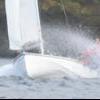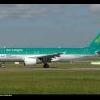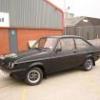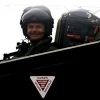

Irish 251
Members-
Posts
250 -
Joined
-
Last visited
Profile Information
-
Gender
Male
-
Location
Dublin, Ireland
Recent Profile Visitors
2,220 profile views
Irish 251's Achievements

Established Member (3/9)
144
Reputation
-
Also flew in these striking colours: https://flic.kr/p/a3LJzJ
- 3 replies
-
- 1
-

-
- Hunter
- gatekeeper
-
(and 1 more)
Tagged with:
-

Colour Film of Lympne Air Show 1936
Irish 251 replied to R T Fishall's topic in Classic - up to 1968
They're not Jungmanns but a bit of googling led to a Air-Britain Archive magazine which said that they were Gerner G II Rs (no, I had never heard of the type either!). https://en.wikipedia.org/wiki/Gerner_G_II_R -
Or is the other one already turning? The photo quality is not really good enough to be certain.
-
The kit options are to be Irish, Portuguese and a red RAF royal version (presumably one that members of the royal family used during flying training.
-
I would not rely too heavily on colour film (possibly Kodachrome slide) for an accurate rendition of what appears to be fluorescent red/orange. This thread may be of interest, as it references two shades and FS numbers 28913 and 28915.
-
Thanks for the review. I have a couple of the earlier issues of this kit, which must not have been a strong seller, as they were discounted substantially at times. Anyway, just to note that for the Berlin Airlift period, none of the aircraft would have had the more bulbous radar nose, which was a late-1950s retrofit. The kit instructions may have this correct but the artwork on the box and for the different markings on the decal sheet seems to me to show the radar nose (which a lot of surviving/preserved C-54s have fitted).
-
Have you seen this book? https://www.google.ie/books/edition/B_57_Canberra_Units_of_the_Vietnam_War/vlWzswEACAAJ?hl=en The author describes the finish as natural metal and photos do seem to show some tonal differences. I think T. E. Bell may frequent these forums on occasion so maybe he will be along to shed further light on the matter.
-
Irish 251 started following Beechcraft Model 18 (03811) 1:48
-
I bought this kit recently, in part being attracted by the text on the back of the box that reads "Several country versions included". As noted in the review, there are just two marking options. Nonetheless I am looking forward to building it. The main thing to note however is that the kit cannot be used to depict the post-war remanufactured versions such as the USAF C-45H, which had enlarged (lengthened rearwards) upper nacelles and also a modified wing centre-section with increased chord. I draw attention to this, as many aircraft seen post-war with the US and other military air arms incorporated these changes. The civilian aircraft (N149L) provided for in the kit decals was a former C-45H so it would also have had the mods I have described. The Navy aircraft seems to have retained the original features so the kit is accurate for it. Geoff Goodall's website has lots of production information and photos covering the many permutations of this timeless design, many of which bear little enough resemblance to the original versions. By the way, Belcher Bits do a simple conversion set to enable the C-45H and equivalents to be modelled.
-

New Tool Airfix Vulcan 1/72 - Black Buck rebox announced
Irish 251 replied to Adam Poultney's topic in The Rumourmonger
The image for XM597 looks correct, though, so maybe all is not lost. -
And on many other aircraft in their ever-expanding collection.
-
This site may be useful too, though the size of the photos is maybe a bit small for detailed reference. https://www.fradu.info/



.thumb.jpg.a15df237fd8d56e4265c64c5f8f26d75.jpg)



